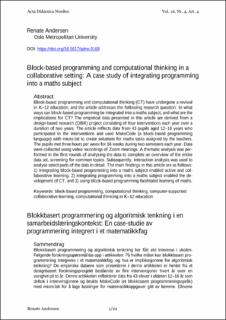Block-based programming and computational thinking in a collaborative setting: A case study of integrating programming into a maths subject
Peer reviewed, Journal article
Published version
Permanent lenke
https://hdl.handle.net/11250/3082098Utgivelsesdato
2022Metadata
Vis full innførselSamlinger
Originalversjon
10.5617/adno.9169Sammendrag
Block-based programming and computational thinking (CT) have undergone a revival
in K–12 education, and the article addresses the following research question: In what
ways can block-based programming be integrated into a maths subject, and what are the
implications for CT? The empirical data presented in this article are derived from a
design-based research (DBR) project consisting of four interventions each year over a
duration of two years. The article reflects data from 43 pupils aged 12–16 years who
participated in the interventions and used MakeCode (a block-based programming
language) with micro:bit to create solutions for maths tasks assigned by the teachers.
The pupils met three hours per week for 16 weeks during two semesters each year. Data
were collected using video recordings of Zoom meetings. A thematic analysis was per-
formed in the first rounds of analysing the data to complete an overview of the entire
data set, screening for common topics. Subsequently, interaction analysis was used to
analyse select parts of the data in detail. The main findings in this article are as follows:
1) Integrating block-based programming into a maths subject enabled active and col-
laborative learning, 2) integrating programming into a maths subject enabled the de-
velopment of CT, and 3) using block-based programming facilitated learning of maths.

